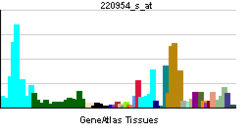PILRB
Paired immunoglobulin-like type 2 receptor beta is a protein that in humans is encoded by the PILRB gene.[3][4]
Cell signaling pathways rely on a dynamic interaction between activating and inhibiting processes. SHP-1-mediated dephosphorylation of protein tyrosine residues is central to the regulation of several cell signaling pathways. Two types of inhibitory receptor superfamily members are immunoreceptor tyrosine-based inhibitory motif (ITIM)-bearing receptors and their non-ITIM-bearing, activating counterparts. Control of cell signaling via SHP-1 is thought to occur through a balance between PILRalpha-mediated inhibition and PILRbeta-mediated activation. These paired immunoglobulin-like receptor genes are located in a tandem head-to-tail orientation on chromosome 7. This particular gene encodes the non-ITIM-bearing member of the receptor pair, which has a truncated cytoplasmic tail relative to its ITIM-bearing partner and functions in the activating role. Alternative splicing has been observed at this locus and three variants, encoding two distinct isoforms, are described. Additional transcript variants have been identified but their full-length nature has not been determined.[4]
References
Further reading
- Fournier N, Chalus L, Durand I, et al. (2000). "FDF03, a novel inhibitory receptor of the immunoglobulin superfamily, is expressed by human dendritic and myeloid cells". J. Immunol. 165 (3): 1197–209. doi:10.4049/jimmunol.165.3.1197. PMID 10903717.
- Strausberg RL, Feingold EA, Grouse LH, et al. (2003). "Generation and initial analysis of more than 15,000 full-length human and mouse cDNA sequences". Proc. Natl. Acad. Sci. U.S.A. 99 (26): 16899–903. doi:10.1073/pnas.242603899. PMC 139241
 . PMID 12477932.
. PMID 12477932.
- Lehner B, Semple JI, Brown SE, et al. (2004). "Analysis of a high-throughput yeast two-hybrid system and its use to predict the function of intracellular proteins encoded within the human MHC class III region". Genomics. 83 (1): 153–67. doi:10.1016/S0888-7543(03)00235-0. PMID 14667819.
- Ota T, Suzuki Y, Nishikawa T, et al. (2004). "Complete sequencing and characterization of 21,243 full-length human cDNAs". Nat. Genet. 36 (1): 40–5. doi:10.1038/ng1285. PMID 14702039.
- Zhu YX, Benn S, Li ZH, et al. (2004). "The SH3–SAM Adaptor HACS1 is Up-regulated in B Cell Activation Signaling Cascades". J. Exp. Med. 200 (6): 737–47. doi:10.1084/jem.20031816. PMC 2211965
 . PMID 15381729.
. PMID 15381729.
- Gerhard DS, Wagner L, Feingold EA, et al. (2004). "The Status, Quality, and Expansion of the NIH Full-Length cDNA Project: The Mammalian Gene Collection (MGC)". Genome Res. 14 (10B): 2121–7. doi:10.1101/gr.2596504. PMC 528928
 . PMID 15489334.
. PMID 15489334.
- Wan D, Gong Y, Qin W, et al. (2004). "Large-scale cDNA transfection screening for genes related to cancer development and progression". Proc. Natl. Acad. Sci. U.S.A. 101 (44): 15724–9. doi:10.1073/pnas.0404089101. PMC 524842
 . PMID 15498874.
. PMID 15498874.
- Wilson MD, Cheung J, Martindale DW, et al. (2006). "Comparative analysis of the paired immunoglobulin-like receptor (PILR) locus in six mammalian genomes: duplication, conversion, and the birth of new genes". Physiol. Genomics. 27 (3): 201–18. doi:10.1152/physiolgenomics.00284.2005. PMID 16926269.

 . PMID 12477932.
. PMID 12477932. . PMID 15381729.
. PMID 15381729. . PMID 15489334.
. PMID 15489334. . PMID 15498874.
. PMID 15498874.